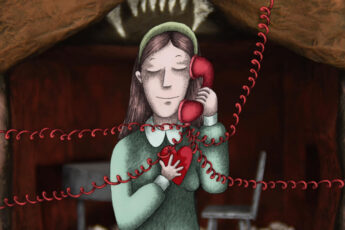Tacit Bonds of Affection
Marek Kozakiewicz’s Silent Love (2022)
Vol. 131 (January 2023) by Zoe Aiano
The documentary Silent Love opens with the central protagonist, Agnieszka, learning that her mother’s health has taken a turn for the worse, bringing her back from her home in Frankfurt to her native Poland. When Agnieszka’s mother dies, she decides to stay to take care of her teenage brother Miłosz, now orphaned, and duly begins the process of becoming his legal guardian. What is only revealed some time later is that she has left a long-term partner behind in Germany, Majka, who is also Polish and also a woman. Determined to stay together, two possibilities open up before them: to suffer the strain of being physically distant, or to risk being openly in love in a country renowned for its growing hostility towards LGBTQ+ communities. To paraphrase Majka, “I’m not worried about lasting in the relationship but about handling life in Poland.”
The film addresses a potentially scandalous topic in a way that is antithetical to any actual scandal. The central lesbian love story is presented in a very matter-of-fact way, balancing moments of tenderness with the banal everyday hassles inherent to all serious relationships, demonstrating the depth of the two women’s mutual affection without over-romanticizing. Similarly, the Polish government’s homophobic agenda and the rising tensions are largely assumed to be self-evident and are only briefly mentioned, with allusions made to the emergence of “LGBT-free zones” on the news and the persistence of homophobic slurs as everyday slang terms.
Although the narrative seems largely chronological, the film periodically cuts back to Agnieszka’s hearing with the social services, in which she is questioned in a court-like setting to determine her suitability as a carer. Somewhat predictably, these sequences culminate in her giving a statement that she is single, essentially perjuring herself. While it is equally depressing and infuriating that she needed to hide her identity from the authorities in order to be considered a responsible citizen, it also isn’t massively surprising and as a punchline it doesn’t quite live up to the dramaturgical build-up. If anything, it would have been more shocking if she’d openly admitted to being a lesbian and still been granted custody.
The aspect given the most attention is the ideological struggle for Miłosz’s soul, as we watch him be indoctrinated at school and church with conservative and nationalist notions of identity. The bulk of his story arc is dedicated to preparations for an end of school year polonaise performance – a dance that apparently requires strict conformity to gender roles, with the men dancing in a manly way while the women remain feminine. The emphasis on this pressure to meet societal expectations is heightened by a shift in cinematic style, which breaks from the standard (and occasionally grating) soft observational approach to a more fluid, emotionally charged montage.
Meanwhile, at home he seems to be developing a bond with Majka, who is increasingly present in his life as she visits more regularly. If anything, her appearance seems to provide a balance in the household and relieves some of the tension between the brother and sister struggling to re-adjust to a parent-child dynamic. The seemingly natural way the three of them form a family is one of the film’s most convincing arguments, as it seems so ridiculous that this kind of configuration should be forbidden. (It’s interesting to note in this regard, however, that the more masculine Majka gets to be the fun one while the more overtly feminine Agnieszka is the bad cop, and is never really shown as a person outside of her position as care-giver and girlfriend). The problem is that Miłosz doesn’t appear to have understood the true nature of Agnieszka and Majka’s relationship, raising the question of how he will react when he does.
This is where the film enters fairly murky ethical grounds. While it deserves to be commended for its humanizing and normalizing portrayal of a same-sex couple in a context where this kind of love is still very much considered a taboo, the involvement of a young boy who isn’t fully conscious of his own circumstances is more questionable. While the adults agreed to being filmed with full awareness of the potential implications for them upon its release, the same cannot be said about Miłosz. This is made even more poignant by the film’s insistence on showing him as naïve and vulnerable, such as in an early scene shortly after his mother’s death when he asks if a crematorium is a place where you get covered in cream. Even giving the director the benefit of the doubt that some kind of plan to address this was in place, it feels uncomfortable at some points.
The film ends at a point where you might expect it to begin – Majka leaves Frankfurt, comes out to her family, and moves in with Agnieszka and Miłosz. This clearly isn’t a story that can end with a happily ever after, as much as you would like it to, but the fact that it leaves viewers concerned for the well-being of everyone involved is a definite strength. While it is important to show the struggle that LGBTQ+ people face when they decide not to hide their identity, it is equally important to get a glimpse into the relationships that make them take the risk, which is precisely what Silent Love does.




Leave a Comment